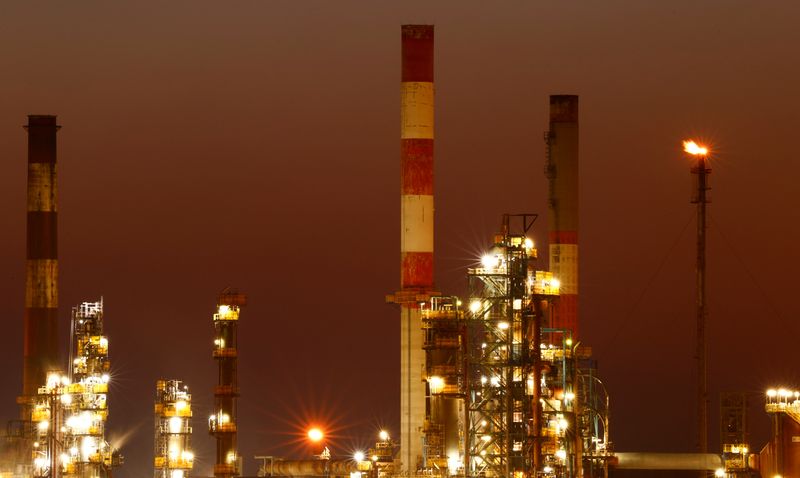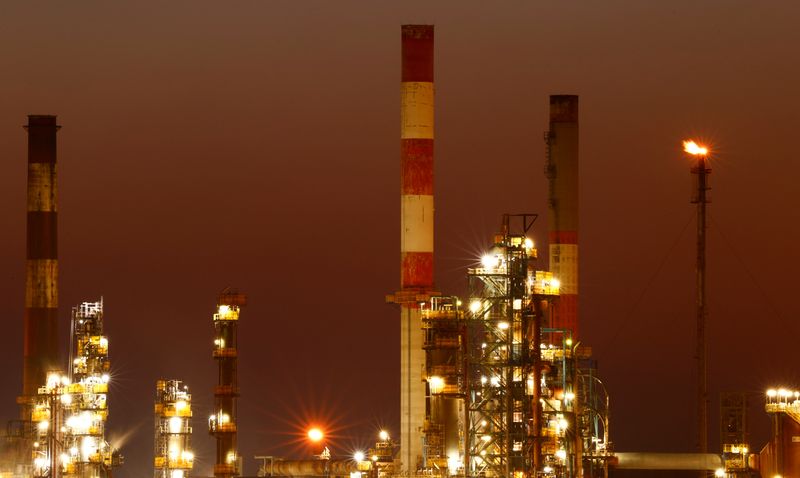Commodities
Markets in Q3: Gains, pains and oil reigns


© Reuters. The chimneys of the Total Grandpuits oil refinery are seen just after sunset, southeast of Paris, France, March 1, 2021. REUTERS/Christian Hartmann
By Marc Jones
LONDON (Reuters) – The equation for financial markets over the last few months has been simple and painful: A near 30% surge in oil prices + a steep rise in borrowing costs = a clattering for global stocks and bonds.
Sub plots have included Saudi Arabia and Russia cutting crude supplies and two African coups, but the main theme has been the Federal Reserve & Co continuing to crank up interest rates.
That higher-for-longer mindset has seen U.S. Treasuries and German Bunds, traditionally the main ballast in portfolios, lose between 5.5% and 6.5%, most which has come this month.
Equity bulls have also been biffed. World stocks are still up a respectable 8% for the year but have given back 7% – or $6 trillion – since August as even the tech giants have gone into reverse.
Gold has lost its shine too meaning that only oil and gas, cash and the dollar have proved reliably profitable.
“It’s not a good time to have an oil shock,” Fidelity’s Global Head of Macro and Strategic Asset Allocation, Salman Ahmed, said explaining his funds had becoming more cautious.
“If you are going above $100 a barrel and staying there you are starting to create that inflation narrative again”.
Those big Q3 bond market losses have came as the – the benchmark for world borrowing costs – has surged roughly 75 basis points to just above 4.5%.
That is the largest quarterly jump in a year and one which hoists it back to its long-term average for the first time since 2007, according to Deutsche Bank. What’s long-term? From 1790 to today..
Germany’s Bund yield is now at nearly 3%, its highest in 12 years. Japan’s meanwhile have nearly doubled, albeit to just 0.75%.
“The bond market has been in control this quarter,” Close Brothers Asset Management CIO, Robert Alster, said. “It has all been about whether the inflation dragon is dead or just wounded”.
HOT OIL
‘s near 30% rise is set to be its eighth best quarter of the millennium although at $97 a barrel it is still 30% below the level it hit after Russia invaded Ukraine.
Since then there have been close to 500 interest rate hikes by central banks globally, including over 100 this year. The U.S was stripped of another triple-A credit rating this quarter too.
Greece though has regained investment grade status for the first time since its debt crisis. Athens’ main stock market is up 26.5% this year, even if it is down 11% since July.
Some the world’s most financially damaged countries have done even better though.
El Salvador’s bonds, now battling out of default, have returned a whopping 24% this quarter and 97% this year. War-ravaged Ukraine’s debt has jumped 22% to take its 2023 rally to 50%. Crisis-hit Pakistan is not far behind.
HOME STRAIGHT
The dollar’s 3% rise is its eighth quarterly gain in the last eleven, while Japan’s yen is now near 150 to the dollar and down 12% for the year.
Europe’s slowdown has seen the euro fall nearly 6% since mid July. Britain’s pound has tumbled over 7% since then too and the ever-volatile bitcoin has dropped 11%.
China’s strains mean the yuan is down fractionally this quarter and 5% for year. And despite monster rate hikes in Turkey following President Tayyip Erdogan’s re-election and policy U-turn, the lira has dropped another 5% this quarter taking its 2023 dive to 30%.
While that still doesn’t match Nigeria and Argentina’s heavily-devalued units, Colombia, Mexico and Brazil’s currencies are respectively up 19%, 11% and 6%.
The rest of the year looks action packed too. More central bank meetings will shape or shift the higher-for-longer rates view. The U.S. government might shutdown. Poland and Ecuador have elections and earnings season will soon be back around.
While the AI boom still matters for the “magnificent seven” – Apple (NASDAQ:), Microsoft (NASDAQ:), Alphabet (NASDAQ:), Amazon (NASDAQ:), Nvidia (NASDAQ:), Tesla (NASDAQ:) and Meta (NASDAQ:) – more than half of these firms’ shares have fallen since the end of June, although Nvidia and Meta are still up around 190% and 150% for the year respectively.
State Street (NYSE:) Global Markets head of macro strategy Michael Metcalfe said its Institutional Investor Indicators show that there has also been a big move into cash although the Q4 surprise could be Japan.
If its central bank does finally join the rate tightening party, globe-trotting Japanese money could move home, leaving a big holes elsewhere.
“The comforting news for Q4 though is that we should be close to peak (global) interest rates,” Metcalfe said.
(Addtional reporting by Dhara Ranasinghe and Elizabeth Howcroft in London; Editing by Toby Chopra)
Commodities
Oil prices rise; U.S. crude inventories plunge, Russia-Ukraine truce eyed
Commodities
India’s Reliance to stop buying Venezuelan oil over US tariffs, sources say
Commodities
Oil prices climb on Venezuela supply worries

 Forex3 years ago
Forex3 years agoForex Today: the dollar is gaining strength amid gloomy sentiment at the start of the Fed’s week

 Forex3 years ago
Forex3 years agoUnbiased review of Pocket Option broker

 Forex3 years ago
Forex3 years agoDollar to pound sterling exchange rate today: Pound plummeted to its lowest since 1985

 Forex3 years ago
Forex3 years agoHow is the Australian dollar doing today?

 Cryptocurrency3 years ago
Cryptocurrency3 years agoWhat happened in the crypto market – current events today

 World3 years ago
World3 years agoWhy are modern video games an art form?

 Commodities3 years ago
Commodities3 years agoCopper continues to fall in price on expectations of lower demand in China

 Economy3 years ago
Economy3 years agoCrude oil tankers double in price due to EU anti-Russian sanctions























